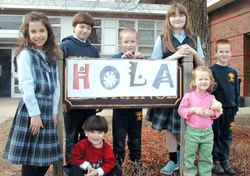Waltham school to bring Spanish instruction to all grades
WALTHAM If all goes as planned every student at Our Lady Comforter of the Afflicted School will soon be able to “hablar Español.”
Beginning in the 2007-2008 school year, the school has announced that it will teach Spanish to all its students -- from its new pre-K program through grade eight.
“Especially with the world being as global as it is, it is extremely important to learn a second language,” said Chandra Minor, principal of the school.
According to Minor, Spanish was chosen to be the foreign language taught at the school after she conducted several surveys, both to the faculty and to the larger parish community.
“Spanish just seemed overwhelmingly the language people were most likely to need in their everyday lives,” she said. “We are excited, therefore, to be able to bring Spanish to our entire student body.”
Minor said that three different teachers would instruct students in Spanish. Use of the language will be incorporated into the daily routine of the pre-K program being launched in September, and older students will receive instruction several times per week.
While the addition of the Spanish-language program is “exciting,” she continued, this is but one of many changes happening at the school this year.
The principal pointed to her school’s motto: “Our Lady’s a school on the move,” to indicate her philosophy of the transitions occurring in the school.
“Our Lady’s is going through a whole-school change,” she explained.
Relying on her experience as a principal in the Boston public school system, Minor began implementing changes shortly after she came to the school in July 2006.
“I knew everything that needed to be done here to become a model Catholic school,” Minor stated.
First she created more opportunities for professional development for the teachers as well as materials and supports for the teachers. Next, she conducted surveys among the students and their families to determine how to best address the needs of the school.
Likening educators to physicians, Minor described the role of a teacher as “diagnosticians of what students need and what needs to be done.”
In order to involve the faculty, Minor created “teams” of teachers that would look at individual students’ needs and suggest ways to “improve each student’s education experience in the school.”
“We wanted to make sure that we are addressing all the needs of all the children in this school,” she stated, “not just the struggling students, but all the students even the most advanced.”
One result is the implementation of a new, schoolwide math curriculum -- one in which advanced students can skip ahead to their appropriate academic level and students who need more help are not pulled out of the classroom, but rather receive extra help from a resource room teacher.
The science department has seen a revamping as well, with students receiving both traditional science and “hands-on laboratory time.”
The reading curriculum has also seen changes. Students now are grouped based on reading levels and independent reading is encouraged.
“We are taking children where they are and moving them to a higher level,” Minor said.
“It’s phenomenal how the school is changing and how receptive the teachers have been to these changes,” she said.
She noted that there is a renewed interest in the school in the community, with several families considering sending their children to the school in the coming year. Although enrollment stands at around 220 students, Minor believes several more students will likely attend the school next year.
“I’m excited about what’s happening here,” she continued. “And the most important thing is that the students are learning.”



















